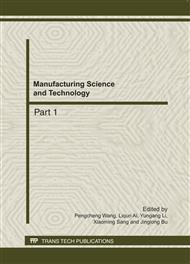p.765
p.769
p.773
p.777
p.781
p.785
p.789
p.796
p.800
Research on Deformation Error of Links of Parallel Robot
Abstract:
Aimed at the effect problem of deformation of links on position error of parallel robot, the 3-TPT parallel robot is taken as a study object. The deformation error of links of parallel robot was built by error independent principle based on kinematics; the simulation analysis also is carried out by virtual prototype technique, and the effect law of deformation of links to error of parallel robot is given. The results showed that when the deformation length of links is given, the position error can be affected by deformation of each link and the coordinate position of origin in reference frame; In the beginning of parallel robot moving, the deformation of links are small, and with the time increasing, the deformation of links obviously affect the final position error of parallel robot. The two method proposed in this paper can be used for pre-estimating the error and reducing harmful effects.
Info:
Periodical:
Pages:
781-784
Citation:
Online since:
July 2011
Authors:
Price:
Сopyright:
© 2011 Trans Tech Publications Ltd. All Rights Reserved
Share:
Citation:


